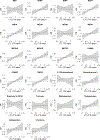Phthalates and Phenols, Leukocyte Telomere Length, and Breast Cancer Risk and Mortality in the Long Island Breast Cancer Study Project
- PMID: 34697054
- PMCID: PMC8755624
- DOI: 10.1158/1055-9965.EPI-21-0830
Phthalates and Phenols, Leukocyte Telomere Length, and Breast Cancer Risk and Mortality in the Long Island Breast Cancer Study Project
Abstract
Background: Phthalates and phenols from the environment have been inconsistently associated with breast cancer risk or mortality. Studies on the potential modifying role of leukocyte telomere length (LTL), a biomarker of biological aging, on these associations are lacking.
Methods: We included 1,268 women from the Long Island Breast Cancer Study Project with available data on phthalate and phenol analytes and LTL measurements. Twenty-two phthalate and phenol analytes were measured in spot urines and LTL was measured in blood. The modifying effect of LTL on the associations of individual analyte with breast cancer risk as well as mortalities was estimated using interaction terms between LTL and urinary concentrations of analyte in logistic regression and Cox regression models, respectively. ORs, HRs, and corresponding 95% confidence intervals for a one-unit (ln μg/g creatinine) increase of urinary phthalate/phenol level were estimated at 10th, 50th, and 90th percentiles of LTL.
Results: LTL significantly (P < 0.05) modified associations between 11 of 22 of urinary phthalate/phenols analytes and breast cancer risk. An inverse association between phthalate/phenols analytes and breast cancer risk at shorter LTL and a positive association at longer LTL was generally suggested. No modifying effect was found for LTL on the association between these phthalate/phenols analytes and breast cancer mortalities.
Conclusions: LTL may modify the associations between phthalate and phenol exposures and breast cancer risk.
Impact: This study is the first study that determined the modifying effect of biological aging in the association between environmental chemical exposure and breast cancer risk.
©2021 American Association for Cancer Research.
Conflict of interest statement
Conflict of interest:
All authors declare that there is no conflict of interest.
Figures

Similar articles
-
Urinary Phthalates and Leukocyte Telomere Length: An Analysis of NHANES 1999-2002.EBioMedicine. 2016 Apr;6:96-102. doi: 10.1016/j.ebiom.2016.02.027. Epub 2016 Feb 18. EBioMedicine. 2016. PMID: 27211552 Free PMC article.
-
Urinary concentrations of environmental phenols and their associations with breast cancer incidence and mortality following breast cancer.Environ Int. 2019 Sep;130:104890. doi: 10.1016/j.envint.2019.05.084. Epub 2019 Jun 19. Environ Int. 2019. PMID: 31228785 Free PMC article.
-
Environmental estrogen-like endocrine disrupting chemicals and breast cancer.Mol Cell Endocrinol. 2017 Dec 5;457:89-102. doi: 10.1016/j.mce.2016.10.003. Epub 2016 Oct 4. Mol Cell Endocrinol. 2017. PMID: 27717745
-
Prediagnosis Leukocyte Telomere Length and Risk of Ovarian Cancer.Cancer Epidemiol Biomarkers Prev. 2017 Mar;26(3):339-345. doi: 10.1158/1055-9965.EPI-16-0466. Epub 2017 Feb 16. Cancer Epidemiol Biomarkers Prev. 2017. PMID: 28209595 Free PMC article.
-
The Association of Bisphenol A and Phthalates with Risk of Breast Cancer: A Meta-Analysis.Int J Environ Res Public Health. 2021 Mar 1;18(5):2375. doi: 10.3390/ijerph18052375. Int J Environ Res Public Health. 2021. PMID: 33804363 Free PMC article. Review.
Cited by
-
Personal Care Product Use during Puberty and Incident Breast Cancer among Black, Hispanic/Latina, and White Women in a Prospective US-Wide Cohort.Environ Health Perspect. 2024 Feb;132(2):27001. doi: 10.1289/EHP13882. Epub 2024 Feb 2. Environ Health Perspect. 2024. PMID: 38306193 Free PMC article.
-
Prenatal exposure to air pollution and BWGA Z-score: Modifying effects of placenta leukocyte telomere length and infant sex.Environ Res. 2024 Apr 1;246:117986. doi: 10.1016/j.envres.2023.117986. Epub 2023 Dec 23. Environ Res. 2024. PMID: 38145728 Free PMC article.
-
Leukocyte telomere length and obesity in children and adolescents: A systematic review and meta-analysis.Front Genet. 2022 Sep 7;13:861101. doi: 10.3389/fgene.2022.861101. eCollection 2022. Front Genet. 2022. Retraction in: Front Genet. 2023 Sep 04;14:1285214. doi: 10.3389/fgene.2023.1285214. PMID: 36160016 Free PMC article. Retracted.
-
Mapping the evolving trend of research on leukocyte telomere length: a text-mining study.Hum Genomics. 2024 Oct 29;18(1):117. doi: 10.1186/s40246-024-00687-5. Hum Genomics. 2024. PMID: 39468654 Free PMC article.
References
-
- ATSDR. Toxicological Profile for Phenol https://www.atsdr.cdc.gov/toxprofiles/tp115.pdf [Last time attempt on Dec 31, 2020]
-
- CDC. Phthalates. https://www.cdc.gov/biomonitoring/pdf/Pthalates_FactSheet.pdf [Last time attempt on Dec 31, 2020]
-
- Mérida-Ortega Á, Hernández-Alcaraz C, Hernández-Ramírez RU, García-Martínez A, Trejo-Valdivia B, Salinas-Rodríguez A, et al. Phthalate exposure, flavonoid consumption and breast cancer risk among Mexican women. Environ Int 2016;96:167–172. - PubMed
Publication types
MeSH terms
Substances
Grants and funding
LinkOut - more resources
Full Text Sources
Medical

